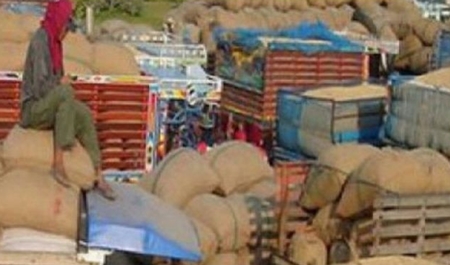BANGKOK, Oct 15 – Several leading members of Thai society today called on the government to revise its highly-criticised rice pledging scheme which has plunged the country into heavy debt since 2011.
Former deputy prime minister/finance minister Pridiyathorn Devakula said the government’s rice purchase at Bt15,000 per tonne has created the worst havoc in Thai history, given the declining rice price in the global market and oversupply from Thailand.

Worse than that, opportunists have cashed in on the government’s scheme, inflicting a severe loss to the state, he said.
Mr Pridiyathorn spoke at a seminar on “From Rice Pledging Saga to Massive Corruption Salvation” to mark the 100th birthday of Dr Puey Ungphakorn, one of Thailand’s most distinguished economists.
He said the financial loss in the 2011/2012 harvest was over Bt200 billion, not including more than one million tonnes of rice which disappeared from government’s stocks as reported by the National Police Bureau, but no legal action has been taken.
The combined losses from two harvest years of 2011/2012 and 2012/2013 could be as high as Bt425 billion, he said, adding that he would submit an open letter to Prime Minister Yingluck Shinawatra calling for a revision of the scheme.
Pramon Sutheewong, chairman of the Anti-Corruption Organisation of Thailand, said the rice subsidy programme has caused severe damage to the country which has become heavily indebted by the budget allocation to intervene in rice purchases.
The government can find other means to help farmers such as direct subsidy to farmers and let market mechanisms regulate the rice price, he said, warning that the financial damage would be massive if the government continues with the rice pledging programme while the quality of rice in the state’s stockpiles would be too low to be exported.
Nipon Puapongsakorn, honorary academic of the Thailand Development Research Institute, said the country would have an accounting loss of over Bt400 billion if it manages to sell rice in its stockpiles in five years but the accumulated loss would be at least Bt400-500 billion if it takes eight years to completely release the purchased rice.
The government has pleased farmers but created heavy loss to the country and it is impossible that the government will sell rice at higher than the pledging price, he said.
He called on the government to be more transparent in carrying out the rice subsidy programme.
Vichai Sriprasert, honorary chairman of the Thai Rice Exporters Association, said several quarters in society have been concerned with the government’s lavish spending to intervene in the rice market which has damaged Thailand’s rice exports for the last two consecutive years.
Now that the government has inflicted damage to the country, it should let rice trading go along the market mechanisms since Thai exporters strongly believe that Thai rice has remained in great demand in the global market, he said.
Rice in the stockpiles nationwide is at least 15-16 million tonnes and the high volume would affect Thailand’s future rice farming, he said.
Instead of pursuing the rice purchase policy, the government should spend the national budget on improvement of irrigation system, reducing farmers’ production cost and finding rice seed for farmers, he said.




